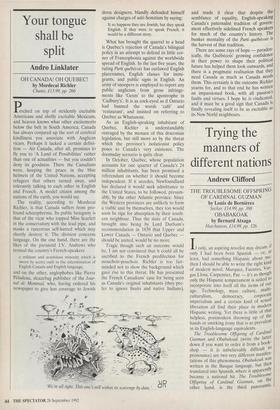Trying the manners of different nations
Andrew Clifford
THE TROUBLESOME OFFSPRING OF CARDINAL GUZMAN by Louis de Bernieres Secker, £14.99, pp. 388 OBABAKOAK by Bernard Atxaga Hutchinson, £14.99, pp. 326 If only, an aspiring novelist may dream, if only I had been born Spanish — or, at least, had something Hispanic about me: then I should be able to write the right kind of modern novel. Marquez, Fuentes, Var- gas Llosa, Carpentier, Paz — it's as though only the Hispanic temperament is suited to incorporate into itself all the items of our age. Technology, mass culture, multi culturalism, democracy, corporate
imperialism and a certain kind of sexual liberation all find their place in modern Hispanic writing. Yet there is little of that helpless, postmodern throwing up of the hands or smirking irony that is so prevalent in its English-language equivalents.
The Troublesome Offspring of Cardinal Gusman and Obabakoak (write the latter down if you want to order it from a book- shop — it is unbelievably difficult to pronounce) are two very different manifes- tations of this phenomena. Obabakoak was written in the Basque language, but then translated into Spanish, where it apparently became a national hit. The Troublesome Offspring of Cardinal Gusman, on tile other hand, is the third panoramic,
Marquezian/Vargas Llosian picaresque novel written in English by English-born Louis de Bernieres. De Bernieres lived in Colombia for quite a while, but that does not fully explain how an English writer can do such a remarkable job of capturing so humorously and modestly the literature of the South American continent.
There is, after all, no greater recipe for disaster than one nation trying to ape another's art — imagine the French having a go at being Angry Young Men. Yet although there is nothing remotely or'ginal about de Bernieres style and form, this novel is a thoroughly enjoyable and almost dazzling tale of a small South American town that defends itself against a modern version of the Spanish Inquisition, told by the numerous characters themselves and a third-person narrator. It is packed with quizzical, breathtaking events: the planting and damming of an area of icy swamp into
a gigantic mappa mundi, or the construc- tion of a huge lift to transport farm equipment and livestock down to a fertile Plain.
Occasionally, de Bernieres misfires the presence of a 15th-century conquista- dor is too obviously magical for my liking. But it is a splendid book, simply because de Bernieres really does seem to have a wealth of stories, jokes and characters up his sleeve. Indeed, the novel gains its indi- viduality simply through its excellence, because otherwise it is completely deriva- tive of other Latin American writing: at one point de Bernieres has an English
ambassador present Wellington bootsto the town as a parting gift — a Marquezian Image which has no authentic sense of real modern Englishness, but which works.
Bernardo Atxaga's collection of stories about or told by the inhabitants of the Basque village of Obaba is lively in a low- key son of a way. It is full of digressions and witty lyricism. Yet it is one of those slight books which only might be brilliant, so that you feel you need to read more from the author before you can tell (rather like trying to judge a poet from a few off-cut verses). These short stories are full of non- endings and half-twists. In the largest tale, a couple of old school friends notice a
school photograph in which one of their classmates is perhaps about to release a
Ilizard into the ear of another classmate -
lizards in ears, we learn, can cause madness. And sure enough, that classmate, now an adult, is simple. They try to find out whether their theory is right, and encounter numerous travellers' tales along the way. This trivial, questing absurdity is
!Ypical of the minutely fantastic register of the book. Yet there are many careless- resses. A few stories seem simply glib and banal, and chapters like 'How to Write a tory in Five Minutes' show a mere clever- c,,leyer erudition, a bit like Milan Kundera. it is enjoyable — if, in the end, rather slight.



































































 Previous page
Previous page